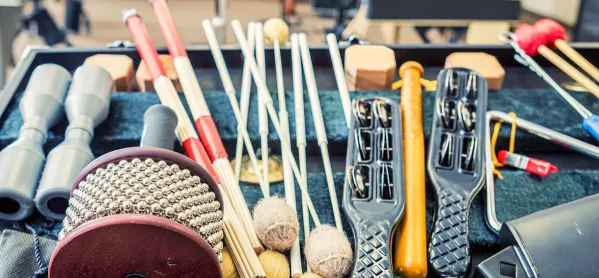Undervaluing arts subjects ‘naive’, warns heads’ union

A headteachers’ union has warned of a “naive undervaluing” of arts in the education system amid fears that creative subjects are being ”squeezed out” of the school timetable.
The NAHT school leaders’ union issued the warning today as Labour reaffirmed its pledge to broaden the curriculum, and after Conservative peers have criticised the government for being too focused on academic learning.
“There persists a naive undervaluing of the employment potential of quality education in the arts,” warned Graham Frost, national executive member at the NAHT.
“The current narrow accountability system we have in this country places little value on creative subjects and so we often see them squeezed out of the school timetable,” added Paul Whiteman, the union’s general secretary.
- Curriculum: ‘Stifling’ GCSEs curriculum ‘overloads’ students, say Lords
- Report: Art education at ‘crisis point’, warns parliamentary group
- GCSE and A level: Why the decline in arts subjects must be a call to action
Labour leader Sir Keir Starmer was set to use a school visit in Essex today to highlight Labour’s plan to broaden the curriculum to ensure that children do not miss out on subjects such as music, art, design, sport and drama.
Sir Keir said it was “immoral” that working-class children are being denied the same opportunities to become Hollywood stars or musical icons as private school pupils.
“We are holding back masses of potential” because of a decline in arts subjects, he added.
Entries to many GCSE and A-level arts subjects have seen a significant decline in recent years.
The latest findings from FFT Education Datalab, commissioned by Tes, reveal that schools with more disadvantaged pupils are less likely to enter pupils for creative subjects, particularly music.
Labour has committed to setting up a curriculum and assessment review and reforms to the main school performance measures if it wins the next general election.
This would see an immediate change to Progress 8 and Attainment 8 to ensure that they always include a creative or vocational subject.
Curriculum changes ‘dismissed’ by government
Reform to the curriculum has also been urged by the cross-party Education for 11-16 Year Olds Committee, which includes former Conservative education secretary Kenneth Baker and former Labour schools minister Jim Knight.
In a report to the government last year, the committee warned that the current education system for 11- to 16-year-olds is too focused on academic learning and written exams.
The group also called for the government’s English Baccalaureate performance measure at GCSE to be scrapped.
However, the government rejected most of the committee’s recommendations, which was today called “disappointing but not surprising” by former minister Lord Jo Johnson.
“We were dismissed in terms of the government’s response,” Lord Johnson said during a panel of committee members this afternoon.
“My personal view is that this represents a very considerable missed opportunity to millions of young people. And I do think that as a country, we can do a lot better,” he added.
Decline in arts numbers
In findings published last week, FFT found that the percentage of pupils doing any qualification in art and design fell from 31 per cent in 2015 to 27 per cent in 2023.
A decline was also seen in music (dropping from 9 per cent in 2015 to 7 per cent in 2023), and in performing arts (20 per cent to 12 per cent respectively).
Pupils in schools with the most disadvantaged populations were least likely to take music or performing arts, FFT found - and where they did, they were least likely to be taking GCSEs in these subjects.
These pupils were also most likely to be in a school where these qualifications weren’t available to them.
The findings come just a year after warnings that arts education is at a “crisis point”, according to a parliamentary report into creative subjects.
A Department for Education spokesperson said: “The government remains committed to pupils receiving a high-quality cultural education, including in music, art and design and dance.
“We are investing around £115 million in music and arts up to 2025, in addition to core school budgets.”
For the latest education news and analysis delivered directly to your inbox every weekday morning, sign up to the Tes Daily newsletter
You need a Tes subscription to read this article
Subscribe now to read this article and get other subscriber-only content:
- Unlimited access to all Tes magazine content
- Exclusive subscriber-only stories
- Award-winning email newsletters
Already a subscriber? Log in
You need a subscription to read this article
Subscribe now to read this article and get other subscriber-only content, including:
- Unlimited access to all Tes magazine content
- Exclusive subscriber-only stories
- Award-winning email newsletters
topics in this article



